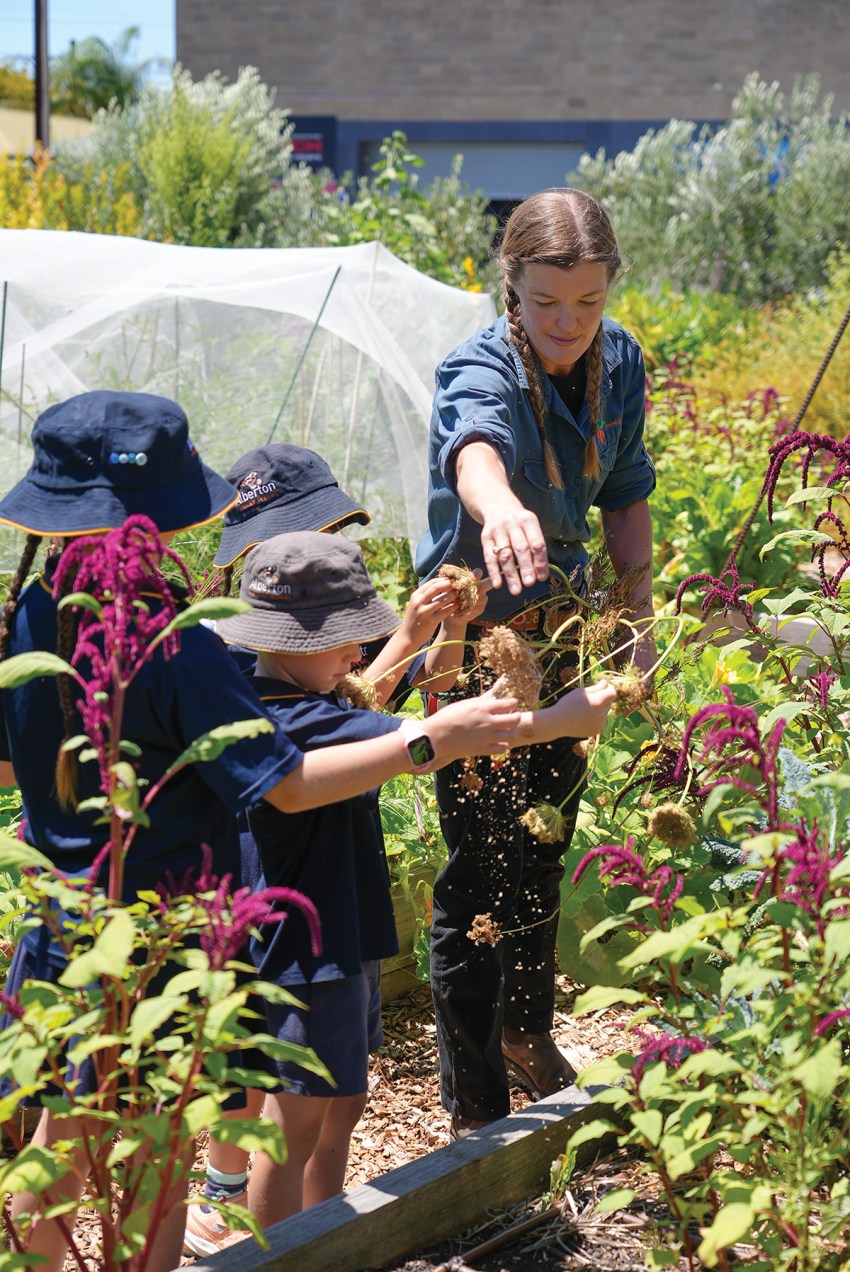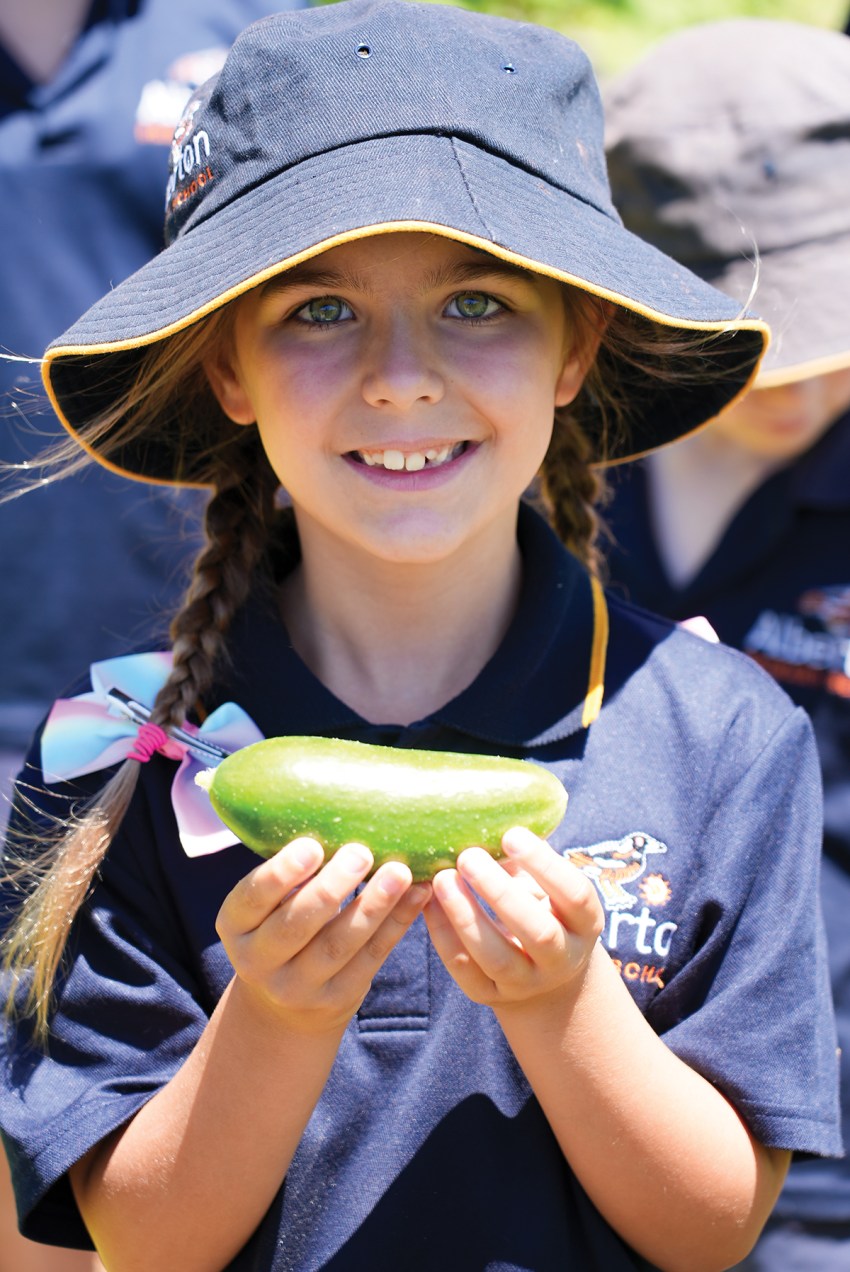Rebecca Mumford loves connecting a child’s natural curiosity to the joy of gardening.
It was more than 18 years ago when Rebecca Mumford took a break from her successful career in the finance sector to become a mother. As she reflects on that decision today, she describes it as a seminal moment.
“Having children changes your perspective of the world and what is important. I have always been an outdoors person and wanted my children to experience the same things I did – spending time in nature, exploring, planting, growing, harvesting, and the innumerable benefits that come from this,” Rebecca says.
When it came time to sending her children to kindergarten, it surprised Rebecca that her local Erindale kindy didn’t have a dedicated produce garden. With her children, Skye and Brooke, fully immersed in their home veggie patch, it seemed logical that this experience be extended for all children to enjoy.
So, volunteering her time, and with the support of the Newland Park Kindergarten’s staff and supporters, Rebecca helped design, construct and fill produce beds, in which young hands were quick to touch and equally eager to plant out. Seeing the impact these gardens made on the children led Rebecca to set up Greenhill Living, a one-person business focused on creating green educational spaces.
It was serendipitous that, Skye’s move to Burnside Primary and Rebecca’s new business, coincided with the school’s Parents & Friends Association looking to develop a produce garden. Another opportunity for her to roll up the sleeves and provide children with a chance to get dirt under their fingernails. The garden beds were a great success for students and teachers alike and continue to be more than a decade later.
Beyond the physical green space, Rebecca saw the need to develop garden educational programs that dovetailed into existing curricula.
“I identified links to the state-endorsed Australian Government ‘Early Years Learning Framework’, connecting plants and gardening with the Framework’s core principles, practices and learning outcomes,” she explains.

You might like
“They aligned brilliantly. The results of having children spend time amongst plants, observing, touching and eating gives them a strong sense of identity, connections with their world, wellbeing, confidence and involvement, and effective communication skills.” Given the additional Early Years Learning Framework’s principle in 2024 is “sustainability”, Rebecca’s Greenhill Living program ticks many of the boxes. There have also been many links made with the Australian Curriculum learning areas, general capabilities and cross-curriculum priorities within primary schools.
Key to Rebecca’s gardens program is the connection of children and teachers to their outdoor learning space.
“I wanted to provide an opportunity for an increasing number of children who never get the opportunity to dig a hole, plant, and care for seedlings, to understand where food comes from. I love it when kids lift potatoes – the look of amazement as the tubers magically appear from under the soil – it is the best.”
Developing a business model that could deliver a single operator-run education program proved vitally important. And seasonality was key.
“Setting up school gardens with no maintenance plan can be very limiting, so I created a seasonal program, which gave me the chance to visit many childcare centres, kindergartens, and primary schools each term, thus matching the seasons. I now support 28 educational institutions in spreading the great green message”.
The time Rebecca spends in a school or early learning centre depends on its needs and budget. For some, it may be one day every term to work with students, giving the garden a makeover and planting up new season vegetables and herbs. For others, a week each term, running her education program, tailored to both the school environment and Australian Curriculum, across a range of year levels.
It is not all about creating new gardens. School gardens often start off keenly planted and neat, but with so many competing priorities, it’s easy to lose focus and the garden suffers. Rebecca is invited to many schools with neglected gardens. “Teachers and ground staff are time poor, and while they would like to include a garden program in their curriculum, seeing an unruly patch may seem a big task to return it to a useful and functional green space. This is the challenge I thrive on. It feels so wonderful when teachers and children get to enjoy the benefits of being outdoors and amongst plants once again.”

Integral to Rebecca’s educational program are her series of garden books. Self-published and beautifully illustrated, the first book series, Gaye, the Garden Girl, whose image was based on one drawn by eldest daughter Skye when she was aged eight, weaves playful stories about summer, autumn, winter and spring, incorporating what is easy to grow and the life cycles of the plants per season. Also, this is the reason she is known across her many schools as “The Garden Girl”.
Further books that soon followed centred around other characters and garden activities, aimed at pre-schoolers. Faye the Farmer Friend introduces broad beans and other legumes. Gary the Garden Guy shows how to build soil, while Pete the Planting Pal is all about leafy greens and herbs.
Subscribe for updates
Rebecca collaborated with science teachers at Burnside and Alberton primary schools to explore the importance of microorganisms in our environment.
What does a dibber do was the result; a book for students highlighting the life beneath our feet and how saving and contributing to our soil is vitally important for a sustainable food future. Generous support from Australian plant health
and soil nutrition care company, Munash Organics, has assisted its publication.
With 10 books in total, many have been inspired by gaps in curriculum resources as identified by teachers: Bill the Bush Tucker Boy resulted from working with teachers at Elizabeth Grove Primary wanting their students to explore native foods.
“I generally begin my garden sessions with a story from one of my books. Whether we are talking about seasonal vegetables, plant life cycles, or compost, there is always a story that aligns with curriculum learning areas and outcomes.”
But gardens never stand still.

“There is always something that needs doing, be it weeding, mulching, watering, or planting, it is wonderful the kids don’t see it as a chore; far from it. They are all engaged and once we are finished, there is a learning tool for teachers, students, and the wider community to enjoy for another term.”
Some of Rebecca’s highlights are when kids share that they have been inspired to set up home gardens, with parents telling her about how the association with growing and eating healthy food has changed dinner for their families … children now excited to eat veggies they would otherwise have rejected.
Rebecca is incredibly proud of her garden program.
“I’ve pushed so hard for 14 years and despite the competition for time across all subject areas, garden learning is still a priority for many kindies and schools, which I know will make a huge difference for the children,” she says.
Years of working with schools and kindergartens has led to many lifelong friendships, such is the nature of garden connections. Support from local businesses, such as Living Colour Nursery, supplying seedlings, and Peats Soil and Garden Supplies has also been gratefully received.
So, what is Greenhill Living’s future?
“I love what I do, despite the challenges that come with supporting so many schools. The joy on the kids’ faces and collaboration amongst teachers will ensure I keep supporting them for as long as I can, while encouraging many more teachers to follow the Greenhill Living Program through the seasons in their school gardens.”
Rebecca’s books are available online greenhillliving.com.au
This article first appeared in the April 2024 issue of SALIFE magazine.





